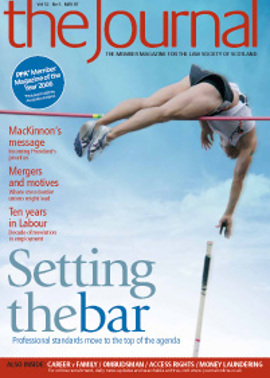Winning ways

In March 2006, my father died. He had been seriously ill for quite some time, but nothing prepared me for the end, when it came. I thought he would go on forever and in the weeks that followed his death I struggled to hold everything together. During this time my mind raced in many directions…. I laughed, I cried and I reflected on the life of a man who was, amongst all other things, a fair, decent and genuine human being.
He was also a very successful man, but I do not draw on his many and varied achievements from the world of business, sport and the military (the latter two in his early years), as this, whilst interesting, would serve no purpose here. What I remember is a man of principle. A man who always had time for people, at all levels, and who never, despite his seniority, became self important. Why is this of relevance to an article on business development? The answer is simple: self-importance is a failing which can get in the way of too many people (young and old) in the professional service sector and one which, until it is recognised and addressed, can hold some back.
Sincerity shows
Reading these words, you might recognise these failings straightaway, no doubt being able to recall one or two examples of such characteristics being displayed. For example, the partner who says good morning to his fellow partners and those he rates, but ignores the filing clerk and secretary passing on the way to their desks. Another who dismisses the suggestion from a junior member of staff merely because it came from them. The trainee or junior assistant who, having gained straight A grades throughout school and having spent four or five years at university achieving an honours degree enabling them to embark on their legal career, does not feel they have anything to learn about giving out name badges at the start of a client event hosted by their firm. Another who dismissively believes they are more important and more valuable to the business than a secretary who has worked for the same firm for over 10 years. Of course, they might well be, in some cases, but it is not a given.
My father believed and taught me that absolutely everyone is important. Value that and you value your people.
The key message, in terms of business development, is this – be sincere in all you do. If not, your insincerity and lack of genuine concern will show through and it will betray you. If, on the other hand, you do genuinely care about the clients and people with whom you are dealing, this will also be evident, and the warmth and friendship which will flow from conversations and meetings will be sincere – because it is – and connections will be made. You can’t pretend to be interested. Your mask will slip. It is not about being able to solve every problem for everyone you meet, nor about impressing them, just about taking the time to (actively) listen, to learn more about them and their issues, to celebrate their success and to be pleased to be able to share some time together.
School of hard knocks
Some people select those they are going to take time to get to know and only devote this kind of attention to them. Fair point – it is important to be strategic; however, a smile, a nod, or a quick hello in passing does not take much effort, nor does it disrupt or affect one’s work pattern in any way. Making time to know your staff and colleagues and what matters to them will add to the good working environment of your business, and being nice to, and knowing, the staff in your key clients’ businesses will pay dividends as well.
My father truly believed that one needed to be “blooded young” in business. What he meant by that was that one needed to have taken a few knocks. If one has passed everything with flying colours, be that exams, a university degree or appraisals from managers, and has gone on to gain promotions with ease, there is a danger that whilst this person is clearly successful they do not have an edge, a sharpness, a hunger for success, which can only be born out of the taste of failure. Knowing the shock and distress of failing at something, or losing a contract or valuable profits, or that perhaps the business is just not coming through the door: so long as the impact is felt, it develops a keenness never to let this happen again.
For so many in the professional service sector, this sense of failure is absent from their lives. The impact of losing a client or tender bears little relevance to their lifestyle. They are cushioned from the reality and therefore do not feel the real pain. For a large number, the work has always landed on their desk and they have done it. They have not had to go out and find new business to ensure the school fees and mortgage are paid and that there is food on the table. The hunger is therefore missing.
Know your game plan
Many may read this and believe this day will never come, when a “professional” need worry themselves about this kind of concern. I would disagree. The professions are changing at a remarkably quick rate. Clients are more discerning, competition is fierce, and just as employees no longer feel there is benefit in staying in the same firm throughout their career (in fact this can now be seen as a positive disadvantage), so too clients often feel that a change of professional adviser can be a good thing also. With clients shopping around and tenders becoming commonplace, those working in the professional service sector need to move with the times and hone their business development skills to ensure they are best placed, (a) to retain the profitable work which they already have, both ensuring that they keep their clients happy and fight off any unwanted attention from competitors, and (b) to maximise any opportunities which present themselves in order to win new work.
The day of the professional acting a bit like – dare I say it – “a sausage factory”, sitting at his or her desk churning out the work which happens to land on it, are long gone, or going fast. Complacency is the greatest danger some face. Professionals now require to shape their careers, decide on their specialism or specialisms and work hard to keep and win the work they want, both for now, today, and for the future. They need to have personal business development plans to ensure they use their time wisely, and to know clearly what they want to achieve and to work towards getting it. I have a favourite question which is, “If I could wave my magic wand and grant you a wish, what would it be?” Would you be able to tell me what business you want and who is going to pass it to you? If not, how can you ever go after it? You have to know what you want, plan how to get it and work through that plan to make it happen. Without that you are living on hopes and dreams.
Lip service?
And finally, ending this where I began, nothing prepared me for the loss I felt when my father passed away. I thought he would go on forever, but in truth I had been given lots of warning signs. He was extremely ill and I know now that whilst I paid lip service to this fact, I did not allow myself truly to believe that anything could happen to take him from my present world. I didn’t face the truth or consider a future without him being there. In the same way, I believe that some in the professional service sector pay lip service to the fact that they now have to actively address their business development skills to ensure they keep their key clients and continue to win new work. Many are doing so, and doing so very effectively, but some, like me with my dad, have not grasped the reality and are not prepared. They are labouring under the misapprehension that being a quality lawyer is enough…
Debbie Atkins LLB(Hons), DipLP is Director of Client Relations Management & Business Development for Tods Murray LLP t: 0131 656 2244; e: debbie.atkins@todsmurray.com (A version of this article first appeared in PM Forum, the professional marketing magazine for the UK, in March 2007. A version with a more extensive list of tips for various business situations can be read at www.journalonline.co.uk/submissions.)
THE RIGHT IMPRESSION: TOP TEN TIPS
- Find ways to keep your clients informed of legal trends and changes which might affect them. Proactively make suggestions. Be invaluable.
- Actively seek feedback.
- Consider how best you can add value to the relationship. Don’t take it for granted.
- Always have a list of your current clients. Colour code them into priorities for action.
- Think about why clients might instruct YOU rather than someone else. If you are not sure, then try to find out by talking to your existing clients.
- Always say “thank you” to those who refer work to you.
- If you promise to do something, be sure to do it. Be careful not to overpromise.
- Think of yourself as an ambassador for your firm. You represent your firm at all times. Make a good impression.
- Smile! – be approachable and nice to be around.
- Physically, and mentally, polish your shoes!
In this issue
- Block fees: the story behind the changes
- Strategic advance
- Court plans with little appeal
- Under commission
- Two into one can go
- Ten years of labour
- Career v Family
- Monitor - at your own risk
- Raising the standard
- Society shapes the changes
- Society shapes the changes (1)
- Money laundering to change again
- Border and Immigration Agency launches
- Dealing positively with client concerns
- From the Brussels office
- Winning ways
- Toothless against spam?
- Risk reinvented
- Technical but essential
- Pension sharing tips on divorce
- In pursuit of simplicity
- In pursuit of simplicity (1)
- First in the class
- Scottish Solicitors' Discipline Tribunal
- Website reviews
- Book reviews
- On the road
- Access or excess?
- Alterations are no 2 problem
- ARTL: upgrade now for security






